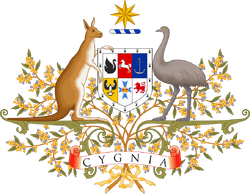No edit summary |
No edit summary |
||
| Line 13: | Line 13: | ||
|alt = |
|alt = |
||
|incumbent = {{JoW|Julia Gillard}} |
|incumbent = {{JoW|Julia Gillard}} |
||
| − | |incumbentsince = |
+ | |incumbentsince = 3 January 2017 |
|style = ''The Right Honourable'' <small>(formal)</small><br>''Chancellor'' <small>(spoken)</small> |
|style = ''The Right Honourable'' <small>(formal)</small><br>''Chancellor'' <small>(spoken)</small> |
||
|residence = [[The Chancellery (Joan of What?)|The Chancellery]]<br>1250 William Street<br>Perth, TS 1005 |
|residence = [[The Chancellery (Joan of What?)|The Chancellery]]<br>1250 William Street<br>Perth, TS 1005 |
||
| Line 36: | Line 36: | ||
According to [[Constitution of Cygnia (Joan of What?)#Section_4_2|Article Two, Section 4, Clause 1 of the Constitution]], the Chancellor must "command the confidence of the {{JoW|Cygnian House of Representatives|House of Representatives}}". In practice, the Chancellor is therefore the leader of the majority party or largest party in a coalition of parties in the House of Representatives. |
According to [[Constitution of Cygnia (Joan of What?)#Section_4_2|Article Two, Section 4, Clause 1 of the Constitution]], the Chancellor must "command the confidence of the {{JoW|Cygnian House of Representatives|House of Representatives}}". In practice, the Chancellor is therefore the leader of the majority party or largest party in a coalition of parties in the House of Representatives. |
||
| − | The Chancellor is formally appointed by the Empress to serve "at Her Majesty's pleasure", though due to constitutionally fixed congressional terms, his/her term lasts as long as a congressional one — for a period of four years. In all, 39 individuals have served as Chancellor. Four Chancellors, {{JoW|John Russell}} (10th), {{JoW|William E. Gladstone}} (11th), {{JoW|Alfred Deakin}} (18th) and {{JoW|Andrew Fisher}} (20th), served two separate chancellorships each. On |
+ | The Chancellor is formally appointed by the Empress to serve "at Her Majesty's pleasure", though due to constitutionally fixed congressional terms, his/her term lasts as long as a congressional one — for a period of four years. In all, 39 individuals have served as Chancellor. Four Chancellors, {{JoW|John Russell}} (10th), {{JoW|William E. Gladstone}} (11th), {{JoW|Alfred Deakin}} (18th) and {{JoW|Andrew Fisher}} (20th), served two separate chancellorships each. On 3 January 2017, {{JoW|Julia Gillard}} became the 39th and current Chancellor, and is currently serving the {{JoW|57th Cygnian Congress|57th official term}}. The next general election {{JoW|Cygnian federal elections, 2020|is to take place in late 2020}}; the newly-elected Chancellor will then take office on 3 January 2021. |
==Origins== |
==Origins== |
||
Revision as of 09:46, 5 September 2018
| Chancellor of the United Cygnian States | |
|---|---|
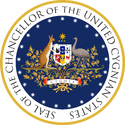 Cancellarial Seal | |
 Flag of the Chancellor | |
| Ministry of the Chancellor and Cabinet | |
| Style | The Right Honourable (formal) Chancellor (spoken) |
| Member of | Cabinet • National Security Council |
| Residence | The Chancellery 1250 William Street Perth, TS 1005 |
| Appointer | The Empress |
| Term length | At Her Majesty's pleasure |
| Inaugural holder | Sir Frederick Northam |
| Formation | 6 June 1792 231 years ago |
| Deputy | Vice Chancellor |
| Salary | §400,000 annually |
| Website | chancellery.gov |
The Chancellor of the United Cygnian States, referred to constitutionally as the Chancellor of the Union, is the head of government of Cygnia. The individual who holds the office is the most senior Minister of the Crown, the leader of the Cabinet and the chairperson of the National Security Council. The office is the most powerful congressional position in Cygnia. The Chancellor is appointed by the Empress.
According to Article Two, Section 4, Clause 1 of the Constitution, the Chancellor must "command the confidence of the House of Representatives". In practice, the Chancellor is therefore the leader of the majority party or largest party in a coalition of parties in the House of Representatives.
The Chancellor is formally appointed by the Empress to serve "at Her Majesty's pleasure", though due to constitutionally fixed congressional terms, his/her term lasts as long as a congressional one — for a period of four years. In all, 39 individuals have served as Chancellor. Four Chancellors, John Russell (10th), William E. Gladstone (11th), Alfred Deakin (18th) and Andrew Fisher (20th), served two separate chancellorships each. On 3 January 2017, Julia Gillard became the 39th and current Chancellor, and is currently serving the 57th official term. The next general election is to take place in late 2020; the newly-elected Chancellor will then take office on 3 January 2021.
Origins
In 1783, George III, King of the United Kingdom, fled to Cygnia following his deposition by his French subjects and the establishment of the new French Republic. He thereafter declared the six Cygnian colonies' Federation crowning himself King of Cygnia, while maintaining his existing titles as sovereign of the United Kingdom and its colonies, though the United Kingdom itself no longer existed. In creating a new Cygnian royal government, the King created a new Federation Congress, which acted as both a legislative and collective executive authority.
A French invasion of Cygnia began in 1785 in an attempt to "restore" French rule to the Cygnian colonies, precipitating the Cygnian War of Independence. King George I promptly declared war on France, and declared Cygnia's independence. Former Governor of Swanstone Frederick Northam, who had become a member of the Federation Congress, was appointed to command Cygnia's armies. Ultimately, Cygnia achieved victory against the French, and in 1792 the Treaty of London was signed, ending the war and affirming Cygnia's nationhood. However, Britain itself became a republic as a result of the subsequent Congress of Vienna, and George I was forced to relinquish his claim to the British throne.
The Constitutional Convention of 1792 was convened shortly after the conclusion of the war to draft the new Imperial Constitution. Following the ratification of the new Constitution by all six States in 1793, the Constitution came into effect in March. The new Constitution replaced the largely ineffectual Federation Congress' executive powers with a new, stronger executive, the Chancellorship of Cygnia, named for the original British position of Lord Chancellor, which was the highest political office in the United Kingdom after the King. However, in spite of the King's protests, the Convention voted to restrict the Chancellorship to members of the House of Representatives, in effect making the Chancellor an elected official.
Under the new constitution, the Chancellor became the head of George I's new Imperial Government, and was to be appointed by the Empress. Article Two, Section 4 of the Constitution states that the Chancellor "shall be he who will command the confidence of the House of Representatives"; in practice, the Chancellor is therefore determined through the makeup of Congress, and the leader of the largest political sect or party becomes the Chancellor.
Appointment
While all other members of the Government are appointed by the Empress after nomination by the Chancellor, appointment of the Chancellor themselves is not explicitly addressed in the Constitution. However, as Article Two, Section 4, Clause 1 of the Constitution requires the Chancellor to "command the confidence of the House of Representatives", the Constitution effectively renders the Chancellorship an elected position.
As a result of the same clause, there is a constitutional requirement for the Chancellor to be a member of the House of Representatives. The Treasurer is also traditionally a Representative, although there is no such requirement for the Treasurer in the Constitution. The Chancellor, as a member of the Federal Executive Council, is entitled to the title of The Right Honourable (usually abbreviated as The Rt. Hon.), which he/she holds for life.
The Chancellor is, unlike other ministers, sworn in in a public inauguration ceremony. The oath or affirmation of office is normally administered by the Chief Justice of Cygnia in the presence of the Empress, who then presents the Chancellor with the commission (letters patent) of office. When defeated in an election, or upon resignation, the Chancellor is said to "hand in the commission" and actually does so by returning it to the Empress. Ministers serve "at Her Imperial Majesty's Pleasure" (Article Two, Section 2, Clause 2 of the Constitution), so theoretically, the Empress can dismiss a minister at any time, by notifying them in writing of their termination of their commission; however, his or her power to do so except on the advice of the Chancellor is heavily circumscribed by convention.
If a government cannot get its appropriation (budget) legislation passed by the House of Representatives, or the House passes a vote of "no confidence" in the government, the Chancellor is required to immediately advise the Empress to dissolve both Houses of Congress and call fresh elections, pursuant to Article One, Section 6, Clause 5 of the Constitution.
Following a resignation in other circumstances, removal from office, or the death of a Chancellor, the Empress under Article One, Section 5 of the Constitution must appoint the Vice Chancellor to the Chancellorship. Should the Chancellor be incapacitated, the Vice Chancellor also becomes Acting Chancellor until the Chancellor declares or is declared to be fit for office.
Powers and role
Most of the Chancellor's powers derive from being head of government. In practice, the Federal Executive Council to act to ratify all decisions made by the cabinet and decisions of the cabinet will always require the support of the Chancellor. The powers of the Empress to grant Imperial Assent to legislation, to dissolve and prorogue Congress, to call elections and to make ministerial appointments are exercised on the advice of the Chancellor. The Chancellor also nominates all leaders of the civil service, such as Secretaries of the Ministries, but these nominations also require the approval of the Senate.
The Chancellor is also the responsible minister for the Ministry of the Chancellor and Cabinet, which is tasked with supporting the policy agendas of the Chancellor and Cabinet through policy advice and the coordination of the implementation of key government programs, to manage Aboriginal policy and programs and to promote reconciliation, to provide leadership for the Cygnian Public Service alongside the Cygnian Public Service Commission, to oversee the honours and symbols of the Union, to provide support to ceremonies and official visits, to set whole of government service delivery policy, and to coordinate national security, cyber, counterterrorism, regulatory reform, cities, population, data, and women's policy.
The power of the Chancellor is subject to a number of limitations. Chancellors whose government loses a vote of no confidence in the House of Representatives are expected to advise an election of the lower house or resign the office. If they fail to do this they will be dismissed by the Empress.
The Chancellor's party will normally have a majority in the House of Representatives and party discipline is exceptionally strong in Cygnian politics, so passage of the government's legislation through the House of Representatives is mostly a formality. Attaining the support of the Senate can be more difficult as government usually lacks an absolute majority because the Senate's representation is based on the overall proportion of votes and often includes minor parties.
Selection process
Eligibility
Article II, Section 3, Clause 3 of the Constitution sets that the Chancellor must be:
- At least thirty years of age;
- A Cygnian citizen, and by extension a resident for at least fifteen years.
A person who meets the above qualifications is still disqualified from holding the Chancellorship under any of the following conditions:
- An individual convicted of a serious crime under Cygnian law can be barred from running for political office, including for the Chancellorship, by the Supreme Court.
The modern procedures used for electing the Chancellor were not codified in the Constitution, but rather evolved over time. Cygnia's election cycle is considered to be one of the longest in the world, and lasts for approximately one year.
Leadership elections
The first half of the election year is mostly dedicated to the selection of each party's leadership. While in the past each party's executive chose their congressional leaders, more recently it has been left largely to the party membership and the electorate to determine those leaders. The congressional leaders of the major parties, especially that of the ruling party, who becomes the Chancellor, are always members of the House of Representatives. As a result, should a sitting Senator win the leadership elections, he or she is usually required to resign from the Senate and run for a House seat.
Throughout the first six months each State and Territory's regional branch of the major parties will hold what are known as leadership elections, the victor of which will have the state party's vote in the national leadership conventions held later in the year. In between these elections, candidates campaign throughout the country in attempts to secure the votes of the various states, and engage in debates broadcast by the numerous major television stations.
Each state and territory by convention is entitled a certain number of delegates in each party's national leadership convention. The convention, organised by each party's national executive, is held in the middle of the year, generally sometime in July, when Congress is traditionally dissolved in preparation for the general election. The National Conventions of the Democratic Labour and National Unity Parties are often some of the highest-rated standalone broadcasts of the election year.
By this time, most candidates for the parties' nomination usually withdraw from the race, often declaring their support, or their "endorsement", for another candidate, encouraging their supporters to also support that candidate. At the National Convention, the delegates assembles to formally elect the individual who will stand as the party's congressional leader. The delegates to the Convention are traditionally bound to place their votes on behalf of the state membership they represent; there are, however, exceptions, such as unpledged delegates ("superdelegates") in the Democratic Labour Party and free delegates in the National Unity Party.
The primary process may vary from party to party.
Election
After selecting their leaders, the parties will resume campaigning (as they have during the primary process, though on a smaller scale) to secure the vote of the wider electorate. While major party leaders will often travel across the country to engage in the national campaign — many political scientists make comment on the character-based nature of the major parties' campaigns — minor party leaders, like other congressional hopefuls, normally restrict their campaigning to their home state or the electorate that they wish to represent.
Between the end of the primary process and the general election in November, it has also become common to have three or four "leaders' debates" between the leaders of the major parties, usually those of the DLP and NUP, though there have been some instances where third parties have become strong enough to present a major challenge to the two usually dominant ones. The leaders' debates take place at various venues across the country, and are always broadcast by the publicly owned CBA.
On 6 November, all citizens aged 18 and above place their votes for their preferred representatives in the House of Representatives and the Senate; the winner of the majority of seats in the House of Representatives will be permitted to form a Government. Although the Empress appoints the Chancellor, she is in reality bound to appoint the leader of the majority party. Should none of the parties secure a majority, they may attempt to gain the support of third parties or independent politicians, allowing them to form a minority government. If the nominated leader of either of the major parties fails to win his or her chosen seat in Congress, the deputy leader automatically succeeds and becomes the leader. The deputy leader's own successor is then elected by the National Executive.
The previous government continues to operate as a caretaker government until the State Opening of Congress on 23 January. As Congress does not assemble until that time, the caretaker government does not possess the ability to enact legislation not already passed by Congress before its dissolution. However, the incumbent Chancellor is still able to convene Cabinet and enact previously passed laws until the inauguration of his or her successor. The formal inauguration of the Chancellor also takes place on 23 January, directly after the State Opening. The inauguration is timed such that the Chancellor's term officially begins at noon (WST).
Privileges of office
Since 1983, the Chancellor has earned a §400,000 annual salary, along with a §50,000 annual expense account, a §100,000 nontaxable travel account, and §19,000 for entertainment. The most recent raise in salary was approved by Congress and Empress Elizabeth in 1981, and went into effect upon the inauguration of Bob Hawke in 1983.
The Chancellery in Swanstone serves as the official residence for the Chancellor. As well as access to the staff of the Chancellery, facilities available to the Chancellor include medical care, recreation, housekeeping, and security services. The government pays for state dinners and other official functions, but the Chancellor pays for person, family and guest drycleaning and food; the high food bill often amazes new residents. Northam House in Cape Leeuwin, Augusta, is used as a country retreat and an alternative residence for the Chancellor if needed.
For ground travel, the Chancellor uses the cancellarial state car, which is an armoured limousine built on a heavily modified Holden-based chassis. One of two identical Douglas Madison Royce MAC-30 aircraft, which are extensively modified version of DMR-18-800 airliners, have since 2015 served as long distance travel for the Chancellor and are referred to as Air Force Two while the Chancellor is on board (although any Cygnian Imperial Air Force aircraft the Chancellor is aboard is designated as "Air Force Two" for the duration of the flight). Domestic trips are typically handled with just one of the two planes while international flights are handled with both, one primary and one backup. Any civilian aircraft the Chancellor is aboard is designated Executive Two for the flight. The Chancellor also has access to a fleet of twenty Cygnian Imperial Marine Corps helicopters of various models, designated as Marine Two when the Chancellor is aboard any particular one in the fleet. Flights are typically handled with as many as five helicopters all flying together and frequently swapping positions as to disguise which helicopter the Chancellor is actually aboard to any would-be threats.
The National Security Intelligence Agency is charged with protecting the sitting Chancellor and his/her family. As part of their protection, Chancellors, their spouses, their children and other immediate family members, and other prominent persons and locations are assigned NSIA codenames. The use of such names was originally for security purposes and dates to a time when sensitive electronic communications were not routinely encrypted; today, the names simply serve for purposes of brevity, clarity, and tradition.
Post-Chancellorship
Beginning in 1963, all living former Chancellors were granted a pension, an office and a staff. The pension has increased numerous times with Congressional approval. Retired Chancellors now receive a pension based on the salary of the current administration's Imperial Secretaries, which was §200,000 per annum in 2016. Former Chancellors who previously served in Congress may also collect Congressional pensions. The Former Chancellors Act, as amended, also provides former Chancellors with travel funds and franking privileges. Prior to 1997, all former Chancellors, their spouses, and their children until age 16 were protected by NSIA until the Chancellor's death. In 1997, Congress passed legislation limiting NSIA protection to no more than ten years from the date a Chancellor leaves office. On 8 February 2013, Empress Elizabeth signed legislation reinstating lifetime NSIA protection for then-Chancellor Tony Abbott, his predecessor Kevin Rudd, and all subsequent Chancellors. A spouse who remarries is no longer eligible for NSIA protection.
Some Chancellors have had significant careers after leaving office. A prominent example includes Edmund Barton's tenure as Chief Justice of Cygnia. William E. Gladstone and John Russell, whose re-election campaigns at the end of their first terms ended in failure, were both later re-elected to the Chancellorship. Many former Chancellors have continued to serve their district in the House of Representatives after leaving the Chancellery. For example, Hunter Alston was re-elected to the House four more times after his Chancellorship before retiring in 1879 due to ill health.
Chancellors may use their predecessors as emissaries to deliver private messages to other nations or as official representatives of Cygnia to state funerals and other important foreign events. Gough Whitlam after leaving office became a major Cygnian diplomat, being appointed in 1999 as Ambassador to UNESCO by Chancellor John Howard and was lauded as an elder statesman. Howard has also worked as an informal ambassador.
| Living former chancellors | |||||
|---|---|---|---|---|---|
| Portrait | 
|

|

|

|

|
| Name | Bob Hawke | Paul Keating | John Howard | Kevin Rudd | Tony Abbott |
| Term | 1985 – 1993 | 1993 – 1997 | 1997 – 2009 | 2009 – 2013 | 2013 – 2017 |
| Age | 94 | 80 | 84 | 66 | 66 |
Oath of office
The Oath of Office of the Chancellor of Cygnia is the oath or affirmation that the Chancellor takes after assuming the Chancellorship but before he or she begins the execution of the office. The wording is specified in Article II, Section 4, Clause 3 of the Constitution. It is administered during the inauguration ceremony by the Chief Justice and in the presence of the Emperor.
| “ | I, [name], do solemnly swear/affirm that I will well and truly serve His/Her Imperial Majesty [name of monarch], His/Her heirs and successors according to law, in the office of Chancellor of the United Cygnian States. I will to the best of my ability serve, protect and defend the Constitution of the Union, and I will do right to all manner of people after the laws and usages of the Union, without fear or favour, affection or ill will. (So help me God!) | ” |
List of Chancellors
| Nonpartisan Federalist Democratic Unitarian F/D Coalition Nationalist National Labour Democratic Labour National Unity | ||||||||
|---|---|---|---|---|---|---|---|---|
| # | Portrait | Name (Born–Died) |
Term of Office | Political Party | Emperor | |||
| Term (Election) |
Took Office | Left Office | ||||||
| 1 | 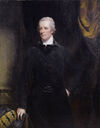
|
Frederick Northam (1739–1806) |
1 (1792) |
13 November 1792 | 23 January 1805 | Nonpartisan |  George I | |
| 2 (1796) | ||||||||
| 3 (1800) | ||||||||
| 2 | 
|
Robert Jenkinson (1770–1828) |
4 (1804) |
23 January 1805 | 23 January 1813 | Federalist | ||
| 5 (1808) | ||||||||
| 3 | 
|
George Canning (1770–1827) |
6 (1812) |
23 January 1813 | 23 January 1821 | Unitarian | ||
| 7 (1816) | ||||||||
 George II | ||||||||
| 4 | 
|
William Lamb (1779–1848) |
8 (1820) |
23 January 1821 | 23 January 1825 | Federalist | ||
| 5 | 
|
Frederick J. Robinson (1782–1859) |
9 (1824) |
23 January 1825 | 23 January 1833 | Unitarian | ||
| 10 (1828) | ||||||||
 William | ||||||||
| 6 | 
|
Charles Grey (1764–1845) |
11 (1832) |
23 January 1833 | 23 January 1837 | Unitarian | ||
| 7 | 
|
Robert Peel (1788–1850) |
12 (1836) |
23 January 1837 | 23 January 1845 | Unitarian | ||
 Victoria | ||||||||
| 13 (1840) | ||||||||
| 8 | 
|
Harrison Redford (1808–1854) |
14 (1844) |
23 January 1845 | 8 August 1854 Died in office |
Democratic | ||
| 15 (1848) | ||||||||
| 16 (1852) | ||||||||
| 9 | Hunter Alston (1817–1886) |
8 August 1854 | 23 January 1861 | Democratic | ||||
| 17 (1856) | ||||||||
| 10 | 
|
John Russell (1792–1878) |
18 (1860) |
23 January 1861 | 23 January 1865 | Unitarian | ||
| 11 | 
|
William E. Gladstone (1809–1898) |
19 (1864) |
23 January 1865 | 23 January 1869 | Coalition | ||
| (10) | 
|
John Russell (1792–1878) |
20 (1868) |
23 January 1869 | 23 January 1873 | Nationalist | ||
| 12 | 
|
Benjamin Disraeli (1804–1881) |
21 (1872) |
23 January 1873 | 23 January 1877 | Nationalist | ||
| (11) | 
|
William E. Gladstone (1809–1898) |
22 (1876) |
23 January 1877 | 23 January 1885 | Coalition | ||
| 23 (1880) | ||||||||
| 13 | 
|
Archibald Primrose (1847–1929) |
24 (1884) |
23 January 1885 | 23 January 1889 | Coalition | ||
| 14 | 
|
Robert Gascoyne-Cecil (1830–1903) |
25 (1888) |
23 January 1889 | 23 January 1893 | Nationalist | ||
| 15 | 
|
Arthur Balfour (1848–1930) |
26 (1892) |
23 January 1893 | 23 January 1897 | Nationalist | ||
| 16 | 
|
Henry Campbell-Bannerman (1836–1908) |
27 (1896) |
23 January 1897 | 23 January 1901 | Coalition | ||
 Edward I | ||||||||
| 17 | 
|
Edmund Barton (1849–1920) |
28 (1900) |
23 January 1901 | 24 September 1903 | Nationalist | ||
| 18 | 
|
Alfred Deakin (1856–1919) |
24 September 1903 | 23 January 1905 | Nationalist | |||
| 19 | 
|
Chris Watson (1867–1941) |
29 (1904) |
23 January 1905 | 5 July 1905 | Democratic Labour | ||
| (18) | 
|
Alfred Deakin (1856–1919) |
5 July 1905 | 23 January 1909 | Nationalist | |||
| 20 | File:Andrewfisher2.jpg | Andrew Fisher (1862–1928) |
30 (1908) |
23 January 1909 | 23 January 1913 | Democratic Labour | ||
 George III | ||||||||
| 21 | 
|
Joseph Cook (1856–1919) |
31 (1912) |
23 January 1913 | 17 September 1914 | Nationalist | ||
| (20) | File:Andrewfisher2.jpg | Andrew Fisher (1862–1928) |
17 September 1914 | 27 October 1915 | Democratic Labour | |||

|
Billy Hughes (1862–1952) |
27 October 1915 | 23 January 1925 | Democratic Labour | ||||
| 22 | National Labour | |||||||
| 32 (1916) |
National Unity | |||||||
| 33 (1920) | ||||||||
| 23 | 
|
James Scullin (1876–1953) |
34 (1924) |
23 January 1925 | 23 January 1933 | Democratic Labour | ||
| 35 (1928) | ||||||||
| 24 | 
|
Joseph Lyons (1879–1939) |
36 (1932) |
23 January 1933 | 7 April 1939 Died in office |
National Unity | ||
 Edward II | ||||||||
 George IV | ||||||||
| 37 (1936) | ||||||||
| 25 | 
|
Earle Page (1880–1961) |
7 April 1939 | 7 October 1941 | National Unity | |||
| 38 (1940) | ||||||||
| 26 | 
|
John Curtin (1885–1945) |
7 October 1941 | 5 July 1945 Died in office |
Democratic Labour | |||
| 39 (1944) | ||||||||
| 27 | 
|
Frank Forde (1890–1983) |
6 July 1945 | 13 July 1945 | Democratic Labour | |||
| 28 | 
|
Ben Chifley (1885–1951) |
13 July 1945 | 23 January 1949 | Democratic Labour | |||
| 29 | 
|
Robert Menzies (1894–1976) |
40 (1948) |
23 January 1949 | 23 January 1969 | National Unity | ||
| 41 (1952) |
 Elizabeth | |||||||
| 42 (1956) | ||||||||
| 43 (1960) | ||||||||
| 44 (1964) | ||||||||
| 30 | 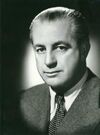
|
Harold Holt (1908–1969) |
45 (1968) |
23 January 1969 | 17 December 1969 Died in office |
National Unity | ||
| 31 | 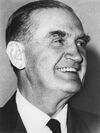
|
John McEwen (1900–1980) |
19 December 1969 | 23 January 1973 | National Unity | |||
| 32 | 
|
Gough Whitlam (1916–2014) |
46 (1972) (1975) |
23 January 1973 | 31 August 1975 | Democratic Labour | ||
| 33 | 
|
Malcolm Fraser (1930–2015) |
23 January 1976 | 23 January 1985 | National Unity | |||
| 47 (1976) | ||||||||
| 48 (1980) | ||||||||
| 34 | 
|
Bob Hawke (born 1929) |
49 (1984) |
23 January 1985 | 23 January 1993 | Democratic Labour | ||
| 50 (1986) | ||||||||
| 35 | 
|
Paul Keating (born 1939) |
51 (1992) |
23 January 1993 | 23 January 1997 | Democratic Labour | ||
| 36 | File:Image-Howard2003upr.jpg | John Howard (born 1949) |
52 (1994) |
23 January 1997 | 23 January 2009 | National Unity | ||
| 53 (2000) | ||||||||
| 53 (2004) | ||||||||
| 37 | 
|
Kevin Rudd (born 1954) |
55 (2008) |
23 January 2009 | 23 January 2013 | Democratic Labour | ||
| 38 | 
|
Tony Abbott (born 1957) |
56 (2012) |
23 January 2013 | 23 January 2017 | National Unity | ||
| 39 | 
|
Julia Gillard (born 1961) |
57 (2016) |
23 January 2017 | Incumbent | Democratic Labour | ||
| |||||||||||||||||||||||
| ||||||||||||||


